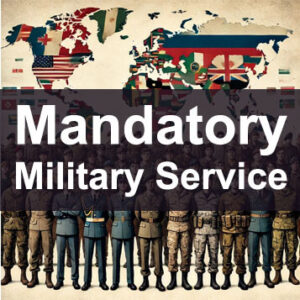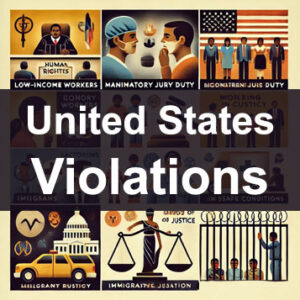Open Statement on Human Rights Abuses Worldwide
Definition of Human Rights: Human rights are the basic rights and freedoms that belong to every person in the world, from birth until death. They apply regardless of where you are from, what you believe, or how you choose to live your life. These fundamental rights are based on values like dignity, fairness, equality, respect, and independence, and they are protected by law.
Categories of Human Rights Abuses:
- Forced Military Service:
- Example: In Eritrea, the government mandates indefinite national service, often involving forced labor and military conscription without pay or under inhumane conditions. This system traps citizens, violating their right to free choice of employment and exposing them to harsh treatment and punishment.
- Repression of Freedom of Expression:
- Example: China has intensified repression in regions like Xinjiang and Tibet, arbitrarily detaining millions of Uyghurs and other Turkic Muslims. These actions include severe restrictions on freedom of expression, association, and assembly, and they amount to crimes against humanity. The use of advanced technology to surveil and censor dissenting voices further exacerbates the situation.
- War Crimes and Conflict-Related Abuses:
- Example: In Sudan, the conflict between military factions has led to widespread abuses against civilians, especially in the Darfur region. These include unlawful killings, forced displacements, and systematic violence, reflecting a broader failure of international mechanisms to protect human rights in conflict zones.
- Collective Punishment and Indiscriminate Attacks:
- Example: The Israeli government’s military operations in Gaza have involved actions like cutting off essential services (water and electricity) and using white phosphorus in populated areas. These measures, which collectively punish civilians and cause extensive harm, constitute war crimes and severe human rights violations.
- Economic and Social Rights Violations:
- Example: Economic inequality and climate change disproportionately impact marginalized communities worldwide. Governments’ failures to address these issues, coupled with corruption and lack of social protections, exacerbate human rights abuses, leaving many struggling for basic survival.
- Discrimination and Violence Against Vulnerable Groups:
- Example: Across various regions, there has been an intensified backlash against the rights of women, girls, and LGBTI individuals. This includes legal and societal discrimination, gender-based violence, and restrictions on reproductive rights, all of which undermine the dignity and freedom of these groups.
Human rights abuses continue to be a pervasive issue globally, affecting millions of individuals. Addressing these abuses requires a concerted effort from international bodies, governments, and civil society to uphold and protect the fundamental rights of every person. It is crucial to hold perpetrators accountable and to ensure that human rights principles are applied universally and consistently, without bias or selectivity.
Ongoing Violations Around The World:
 Mandatory military service violates personal freedom by compelling individuals to serve against their will, restricting their autonomy and right to choose their own life path. Mandatory military service infringes upon personal freedom by forcing individuals to serve in the military, regardless of their personal beliefs, career aspirations, or life plans. This compulsory service limits their autonomy, preventing them from making voluntary choices about their own lives.
Mandatory military service violates personal freedom by compelling individuals to serve against their will, restricting their autonomy and right to choose their own life path. Mandatory military service infringes upon personal freedom by forcing individuals to serve in the military, regardless of their personal beliefs, career aspirations, or life plans. This compulsory service limits their autonomy, preventing them from making voluntary choices about their own lives.
It disrupts educational and professional opportunities and can subject individuals to physical and psychological hardships against their will. Such enforced conscription undermines the fundamental human right to freedom of choice and self-determination, which are essential components of personal liberty and dignity.
 In the United States, one form of mandatory service that has raised concerns about human rights violations is the practice of jury duty and other court-related obligations. While jury duty is considered a civic responsibility, some argue that mandatory participation can infringe upon personal freedoms and impose significant burdens, especially for those who cannot afford to take time off work or have other pressing commitments.
In the United States, one form of mandatory service that has raised concerns about human rights violations is the practice of jury duty and other court-related obligations. While jury duty is considered a civic responsibility, some argue that mandatory participation can infringe upon personal freedoms and impose significant burdens, especially for those who cannot afford to take time off work or have other pressing commitments.
Key Concerns: Economic Impact: Many individuals face financial hardship when summoned for jury duty. Although they receive a nominal daily stipend, it is often insufficient to cover lost wages, particularly for low-income workers or those without paid leave. This economic strain can be seen as a violation of their right to work and maintain an adequate standard of living. Disruption to
Personal Life: Mandatory court service can significantly disrupt personal and family life. Those with caregiving responsibilities, health issues, or other personal commitments may find it particularly challenging to comply with jury duty, potentially violating their right to personal autonomy and family life.
Forced Compliance: Failure to comply with a jury summons can result in legal penalties, including fines or even imprisonment. This compulsory aspect raises concerns about the infringement of personal liberty and the use of state power to enforce participation in civic duties. Broader Context of Human Rights Violations in the US: Child Labor: There has been a reported increase in child labor violations, with many children, particularly unaccompanied migrants, working in dangerous and exploitative conditions. These practices violate their right to education, health, and safety.
Drug Policy and Overdose Crisis: The US continues to face a severe overdose crisis, exacerbated by racial disparities in access to treatment and biased policies. The criminalization of drug use instead of adopting health-centered approaches contributes to human rights abuses, particularly among marginalized communities. Immigrants’ Rights: Policies such as Title 42 and the use of the CBP One app for asylum seekers have led to systematic human rights violations, including arbitrary detention, exposure to violence, and inadequate protection for vulnerable individuals.
Women’s and Girls’ Rights: The overturning of Roe v. Wade and subsequent state-level abortion restrictions have severely impacted women’s and girls’ rights to health, autonomy, and safe medical care. These restrictions disproportionately affect marginalized communities, exacerbating existing inequalities. These issues highlight the need for continued vigilance and reform to protect and promote human rights within the United States.
Other Ongoing Human Rights Abusing:
Forced Labor: The North Korean government routinely uses forced, uncompensated labor to sustain its economy. This affects various groups, including women, children, workers at state-owned enterprises, and prisoners. Forced labor is often justified as displays of loyalty to the regime and can result in severe punishment for non-compliance.
Restrictions on Freedom of Movement: Moving within the country or traveling abroad without permission is illegal. The government has strict enforcement measures, including a “shoot-to-kill” order for those attempting to cross the border without authorization. This severely impacts people’s livelihoods and access to essential goods.
Political Prison Camps: North Korea operates numerous political prison camps where detainees are subjected to torture, forced labor, and inhumane conditions. These camps are used to punish perceived political enemies and maintain control over the population through fear.
Persecution of Religious Believers: The regime persecutes religious practitioners, particularly Christians, who face harsh treatment, imprisonment, and even execution for their beliefs. This persecution is part of the broader effort to suppress any dissent or alternative ideological influences.
Use of Public Trials and Executions: The government uses public trials and executions as tools to instill fear and maintain control. Individuals accused of minor offenses, such as using South Korean slang or watching unsanctioned videos, can be sentenced to lengthy prison terms or even death.
Impact of COVID-19 Measures: The government’s excessive and unnecessary COVID-19 restrictions have exacerbated food and medicine shortages, worsening the already dire humanitarian situation. These measures have further isolated the population and increased the regime’s control.
Abductions and Enforced Disappearances: North Korea has a history of abducting foreign nationals, including South Koreans and Japanese citizens. These individuals are often never returned, and their fates remain unknown. The government has also kidnapped defectors and their families from China.
These violations highlight the urgent need for international attention and action to address the human rights crisis in North Korea. For more detailed information, you can refer to reports by Human Rights Watch and other human rights organizations.
